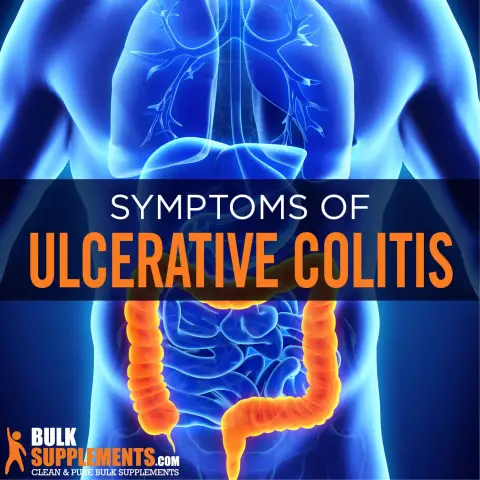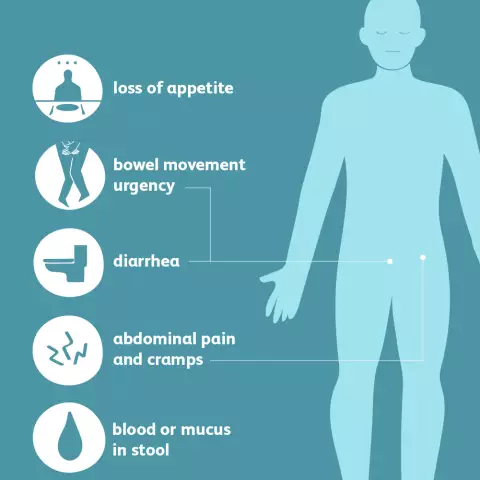- Author Rachel Wainwright wainwright@abchealthonline.com.
- Public 2023-12-15 07:39.
- Last modified 2025-11-02 20:14.
Ulcerative colitis
Brief description of the disease

Ulcerative colitis is a chronic inflammation of the large intestine. The second common name for the disease is ulcerative colitis.
The disease affects the submucosa and mucous membranes of the large intestine, causing the appearance of non-healing wounds.
Causes of the disease
To date, there is no exact data on the causes of ulcerative colitis. Weakened immunity and malnutrition are considered the main reasons. Also, infections in the digestive tract, worms, alcohol, lack of personal hygiene, and prolonged antibiotic therapy can provoke this disease.
Ulcerative colitis symptoms
The symptoms of ulcerative colitis may differ in severity and localization - it all depends on the stage of the disease.
General symptoms of the disease: diarrhea, fever, weakness, vomiting, constipation, abdominal pain, intestinal bleeding, weight loss, increased frequency of bowel movements up to 5-20 r / day, incl. at night, increased fatigue.
Extraintestinal symptoms may also develop: uveitis, erythema nodosum, arthritis.
It was also noted that the disease in most cases begins and develops imperceptibly, and more pronounced symptoms of ulcerative colitis are observed in severe cases, therefore, at the first similar signs, it is important to seek medical help and undergo treatment when confirming the diagnosis.
Diagnosis of the disease
If ulcerative colitis is mild, it is diagnosed without complications. And already at the first examination after a colonoscopy or rectoscopy, a diagnosis is made. With the help of these endoscopic examinations, the doctor can notice redness of the mucous membrane, its granularity and swelling, hemorrhages and the absence of a vascular pattern on the intestinal walls.
To confirm the diagnosis, laboratory tests of feces, a blood test for the level of ESR, C-reactive protein, and hemoglobin are performed.
In rare cases, an X-ray examination method is also used. This examination is especially useful when Crohn's disease must be ruled out if benign narrowing of the colon is found.
In severe cases of the disease, endoscopy and X-ray are contraindicated - they are limited only to a snapshot of the abdominal cavity.
Ulcerative colitis treatment
Treatment of ulcerative colitis is prescribed medication. The patient is prescribed anti-inflammatory drugs and those that restore the immune system. Anti-inflammatory drugs are used systemically and locally in the form of enemas.
In severe cases of complications of the disease by the formation of fistulas in the intestine and malignant tumors, surgical treatment of ulcerative colitis is indicated - the affected area of the intestine is removed.
In severe and moderate forms of the disease, bed rest is indicated.

Due to the violation of the absorption of nutrients from food by the intestines, the patient is shown a diet.
The point of the ulcerative colitis diet is to refrain from coarse fiber, increase protein intake, and limit fat. If diarrhea with colitis is severe, fluid intake should be limited.
Recommended products: lean meats, boiled and steamed, mashed porridge, eggs, dry biscuits, toasted white bread, fruit jelly, bird cherry, pomegranate, blackcurrant juice, blueberry juice or compote, walnuts.
You cannot eat fresh vegetables, fruits, dairy products.
During the ulcerative colitis diet, you should eat in small portions - about six times a day. Dinner should be no later than 21.00.
It is undesirable to take antibiotics during treatment - these drugs can aggravate the course of the disease. They are prescribed in extreme cases.
Prevention of the disease
For the prevention of colitis, it is necessary to monitor immunity and nutrition, undergo treatment for various gastrointestinal diseases on time, get rid of worms, do not abuse alcohol, and observe the rules of personal hygiene.
YouTube video related to the article:
The information is generalized and provided for informational purposes only. At the first sign of illness, see your doctor. Self-medication is hazardous to health!






